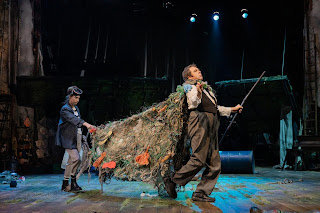Like the very first RSC Tempest I saw - Sam Mendes' in the 1990s - this creates a landscape that doesn't conjure a particularly literal picture of the island where the entire action is set, but an overtly theatrical backdrop for Prospero's tricks and magic - Piper's set uses the building's original proscenium arch to suggest a crumbling Victorian theatre.
Alex Kingston plays Prospero, the former Duke of Milan who was (quite rightly) deposed and exiled by her brother Antonio many years earlier. Now, a ship passes the island where Prospero and her daughter Miranda live, carrying all the people she holds a grudge against. She shipwrecks them using a combination of magic, and the army of magical slaves she's accrued through... basically just being really good at enslaving people for fun and profit. Then she sets about putting them all through trials and misdirections that are meant to teach them that, if you try to neutralise a wizard who likes accruing powers with no indication of wanting to use them for good, they will use them for bad and it'll somehow be your fault.
Kingston's take on Prospero leans a bit more towards the gentler portrayal of someone ultimately benevolent - her costume seeming to consist largely of aprons certainly gives her a bit of a mumsy air, and she has a comically brisk manner as she goes about putting her plans in motion. But she does also bring out a scary steeliness worthy of someone who's never met anyone she didn't think she'd like better if she just tortured them into submission. The balance is still more towards the sympathetic view, with a focus on Antonio (Jamie Ballard) and Sebastian's (Grace Cookey-Gam) murderous instincts. (Obviously I'm still not sold on Prospero being allowed anywhere near power, Antonio's a machiavellian supervillain but he's a Renaissance ruler so that's basically in the job description, at least he actually intends to do the job.)
Among the rest of the shipwrecked Milanese and Neapolitans, I liked Ishia Bennison bringing out the touch of self-awareness to the rambling advisor Gonzalo. But Simon Startin and Cath Whitefield go for a very broad, mugging style for Stephano and Trinculo, which doesn't work for me and didn't elicit many laughs from the rest of this afternoon's audience either (but it's The Tempest so my expectations of it living up to its billing as a comedy are never high anyway.)
The play is lumbered with possibly the blankest of all Shakespearean young lovers, and Joseph Payne makes some attempt to give Ferdinand a personality with some comic business as he does his chores for Prospero, notably collecting the audience's post-interval litter. Jessica Rhodes on the other hand leans into Miranda as being little more than her mother's puppet: She actually gives hints of having some affection for Caliban, but falls in line to back up Prospero's abuse of her slave.
Which brings me to probably the most interesting character work in Freestone's production, which puts Tommy Sim'aan's Caliban firmly in place as the play's central tragic figure: The orphan initially raised as a surrogate son, Prospero turned against him when he became sexually interested in Miranda, whose reactions to him cast doubt on her mother's claim that it was unreciprocated. Cast out and magically tortured into slavery, he holds onto, and prays to, his dead mother's talisman that nods to the enslaved population of the island clinging onto its old religion.
There's a suggestion of an abused child growing up to seek out other controlling relationships in the way he latches onto Stephano, but he also proves not to be as dumb as anyone thinks: He only pretends to get hooked on alcohol and make the butler his new god, actually using him in his attempt to assassinate his master.
Outside of the design there isn't a lot that overtly references the production's climate emergency theme, apart from the "such stuff as dreams are made on" speech, which Kingston gives a desperate note of panic at the fragility of everything. The Tempest isn't one of my favourites, and this production takes a while to come to life and has moments that drag - we get some business with Prospero moving rubbish around to illustrate the endless Basil Exposition speeches but those are pretty much a lost cause. But overall it comes out as one of the more watchable interpretations I've seen in recent years, with some interesting takes on some of the characters.
The Tempest by William Shakespeare is booking until the 4th of March at the Royal Shakespeare Theatre, Stratford-upon-Avon.
Running time: 2 hours 55 minutes including interval.
Photo credit: Ikin Yum.








No comments:
Post a Comment